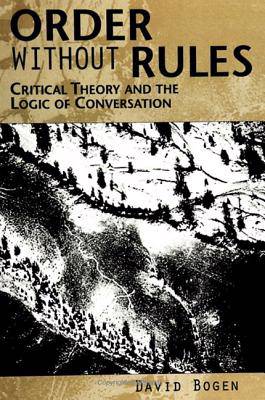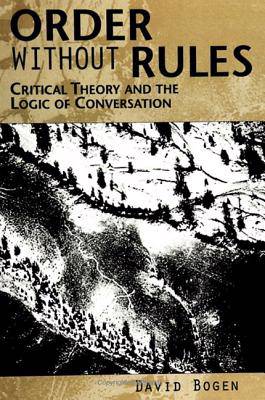
- Retrait gratuit dans votre magasin Club
- 7.000.000 titres dans notre catalogue
- Payer en toute sécurité
- Toujours un magasin près de chez vous
- Retrait gratuit dans votre magasin Club
- 7.000.0000 titres dans notre catalogue
- Payer en toute sécurité
- Toujours un magasin près de chez vous
Description
Questions whether the logic of language underlying Habermas's theory of communicative action is in fact the defining feature of conversational practice.
Order Without Rules establishes the basic terms for a critical discourse between the theory of communicative action and the tradition of practice-based inquiries inspired by Wittgenstein and elaborated within the field of ethnomethodology. It argues that such a discourse not only is possible, but that it is essential if critical theory is to move beyond the crisis caused by the decline of the great rationalist social projects of the past two centuries and the simultaneous rise of an array of post-enlightenment and anti-rationalist movements waiting to take their place.
Since Max Weber social theory has been faced with a paradox-the "problem of rationality"-that seems to challenge the very foundations of critical and humanist visions of modern society. According to Weber, as industrial societies develop they increasingly are dominated by rational procedures for the production of goods, the organization of human resources, and the management of information. The paradox consists in the fact that while modern society is, in this instrumental sense, becoming more rationalized, the prospects for developing political and cultural institutions which are linked to a progressive vision of rational discourse and democratic-will formation are diminished.
Order Without Rules addresses the "problem of rationality" in its most contemporary incarnation: the critical theory of the German philosopher and social critic, Jürgen Habermas. Habermas attempts to resolve the Weberian paradox by identifying the rational "core" of communication with universal processes of interpretive understanding that are present in everyday conversation. Drawing upon the work within the Wittgensteinian and ethnomethodological traditions of linguistic and social analysis, this book questions whether the logic of language underlying Habermas's theory of communicative action is in fact the defining feature of conversational practice. It is argued that Habermas's conception of linguistic rules and their connection to rational action is ill-founded, and that a fundamental rethinking of his concept of communicative action is therefore required. Throughout the book, a reflexive orientation is maintained toward questions of method and the internal relationship between disciplinary practices and empirical phenomena.
Spécifications
Parties prenantes
- Auteur(s) :
- Editeur:
Contenu
- Nombre de pages :
- 188
- Langue:
- Anglais
- Collection :
Caractéristiques
- EAN:
- 9780791440551
- Date de parution :
- 29-04-99
- Format:
- Livre relié
- Format numérique:
- Genaaid
- Dimensions :
- 152 mm x 229 mm
- Poids :
- 435 g

Les avis
Nous publions uniquement les avis qui respectent les conditions requises. Consultez nos conditions pour les avis.






